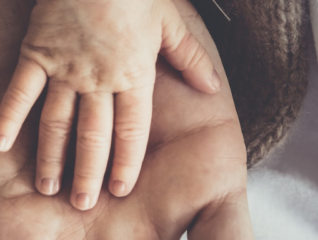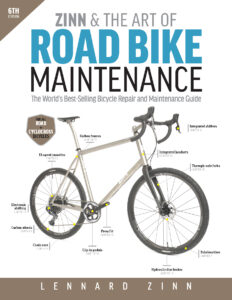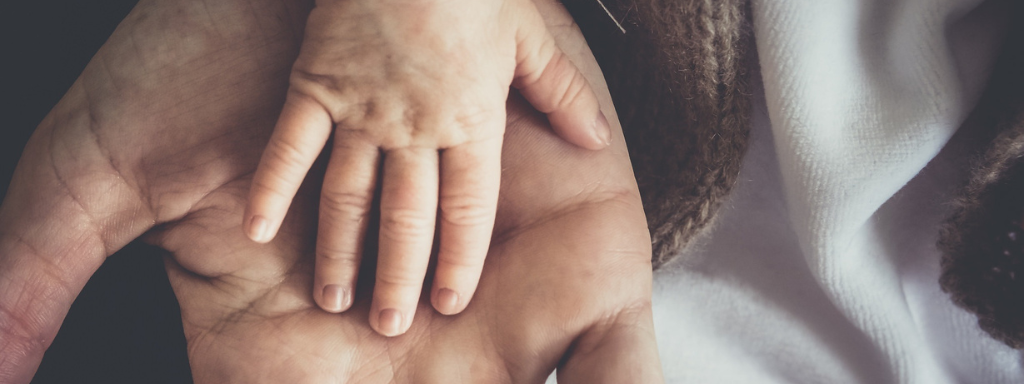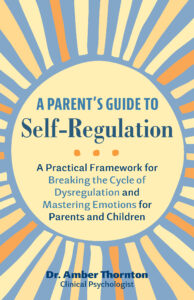
Navigating Parenthood: Overcoming the 5 Biggest Concerns of Dysregulated Parents
- Book Sample
When it comes to emotional regulation during parenting the topic always can be a little overwhelming. Being a parent is already hard and dealing with our own emotions plus the big emotions of our tiny humans, can make it even harder. Dr. Amber Thornton, a licensed Clinical Psychologist and strong advocate for the mental health and well-being of parents and Ulysses Press author explains in this article the biggest concerns of dysregulated parents! You can find this and more advice on self regulating emotions and becoming a better parent in her newly released book A Parent’s Guide to Self-Regulation: A Practical Framework for Breaking the Cycle of Dysregulation and Mastering Emotions for Parents and Children.
***
Parenting isn’t easy. We all experience moments of overwhelm, frustration, and self-doubt. I’ve struggled with these emotions myself – feeling overstimulated, irritable, and inadequate at times. However, through my research and personal experiences, I’ve realized that I’m not alone. Many parents out there are grappling with similar feelings, wondering if they’re doing enough for their children and questioning their own abilities.I’m not alone and neither are you. I’ve been there, too. Through my work and research with parents, I’ve discovered that there’s a way forward – a way to break free from the cycle of dysregulation and become the parent you’ve always wanted to be.
I’m thrilled to share some game-changing insights from my upcoming book, A Parent’s Guide to Self-Regulation: A Practical Framework for Breaking the Cycle of Dysregulation and Mastering Emotions for Parents and Children. Writing this book has helped me to reflect even more on my own journey as a parent and the hurdles I’ve overcome along the way.
In my book, I tackle five common concerns that many parents face when it comes to managing their emotions and their children’s. These concerns can weigh heavily on us, causing doubt and anxiety. But they don’t have to define us. With the right tools and strategies, we can transform these challenges into opportunities for growth and connection.
1. Am I inadequate as a parent?
This is a question that haunted me for a long time. I used to feel like I was failing my children because I couldn’t always keep my cool or handle difficult situations with grace. But as I’ve delved deeper into the topic of self-regulation, I’ve come to understand that every moment with my children is a learning opportunity. Even the mistakes and mishaps are chances for growth. In my book, I encourage parents to shift their perspective from feeling inadequate to recognizing the progress they’ve made and the lessons they’ve learned along the way.
Furthermore, I’ve learned that embracing imperfection is essential to fostering resilience in ourselves and our children. By acknowledging our shortcomings and openly discussing them, we create an environment where growth and self-improvement are celebrated. It’s not about being a flawless parent; it’s about showing up, learning from our experiences, and continuously striving to do better for our families.
2. Am I setting a bad example for self-regulation for my kids?
As a parent, I’ve often worried that my struggles with dysregulation would negatively impact my children’s ability to manage their emotions. But what if I’m not setting a bad example at all? What if, instead, I’m showing them that it’s okay to be human and to make mistakes? In my book, I explore the importance of modeling self-compassion and resilience for our children, even when we’re facing our own challenges.
Moreover, I’ve realized that by openly acknowledging my struggles and actively working on self-regulation, I’m teaching my children valuable lessons about resilience and growth mindset. They see that it’s normal to experience emotions and that it’s possible to bounce back from setbacks. Instead of striving for perfection, I aim to show them the power of self-awareness and the importance of seeking support when needed.
3. Am I repeating a pattern of parenting that I grew up with?
This question hits close to home for many of us. We’re often keenly aware of the ways in which our own upbringing influences our parenting style, and we may worry about perpetuating harmful patterns. But what if we’re not doomed to repeat the past? What if we can break free from those cycles and create a new, healthier dynamic with our children? In my book, I offer strategies for recognizing and challenging these patterns, paving the way for positive change.
Additionally, I’ve found that understanding the roots of my parenting behaviors has been instrumental in breaking the cycle. By examining my own upbringing and the patterns I observed, I’ve gained insight into why I react certain ways and how I can choose different approaches for my own family. It’s empowering to know that I have the power to rewrite my parenting narrative and create a more nurturing environment for my children.
4. How will I ever learn to self-regulate when times are always hard?
Parenting is tough, and life is full of challenges. It’s easy to feel overwhelmed and wonder if we’ll ever be able to get a handle on our emotions. But what if every difficulty is an opportunity for growth? What if we can learn to navigate life’s ups and downs with greater resilience and self-awareness? In my book, I provide practical tools and techniques for managing stress and regulating emotions, even in the face of adversity.
Furthermore, I’ve come to see challenges as opportunities for personal growth and transformation. Instead of viewing difficult times as insurmountable obstacles, I approach them as chances to develop my self-regulation skills and strengthen my resilience. By practicing mindfulness, setting boundaries, and seeking support when needed, I’ve learned to navigate even the toughest situations with more ease and grace.
5. Will my dysregulation cause a lasting impact on the relationship with my family or their mental health?
This is perhaps the most heart-wrenching question of all. We want nothing more than to provide a loving, supportive environment for our children, and we worry that our own struggles will harm them in some way. But what if our efforts to repair and grow actually strengthen our relationships in the long run? What if our children learn resilience and empathy from witnessing our journey? In my book, I emphasize the importance of repair and accountability in maintaining healthy family dynamics, offering guidance for nurturing strong, resilient connections with our loved ones.
Moreover, I’ve found that by acknowledging my mistakes and taking responsibility for my actions, I’ve deepened my connections with my family. When I apologize and make amends, I show my children that I value our relationship and am committed to fostering trust and understanding. Through this process of repair, we not only heal any wounds caused by dysregulation but also strengthen the bonds that hold us together as a family. Through my own experiences and the stories shared by other parents, I’ve come to believe that self-regulation is not just a skill – it’s a journey of self-discovery and growth.
And while it’s not always easy, it is possible to cultivate greater emotional resilience and create a more nurturing environment for ourselves and our children. So if you’re tired of feeling overwhelmed and unsure of yourself as a parent, if you’re ready to take control of your emotions and create a more harmonious family dynamic, then this book is for you.
Join me on this journey as we explore the power of self-regulation and discover how it can revolutionize your parenting experience.
I invite you to order A Parent’s Guide to Self-Regulation: A Practical Framework for Breaking the Cycles of Dysregulation and Mastering Emotions for Parents and Children, and join me on this journey toward growth and self-discovery. Together, we can create a more nurturing and supportive environment for ourselves and our children.
Thanks for tuning in today, and I’ll catch you next time. Take care!








